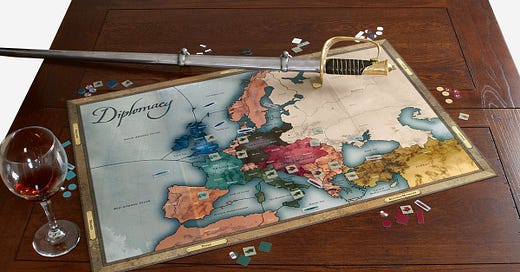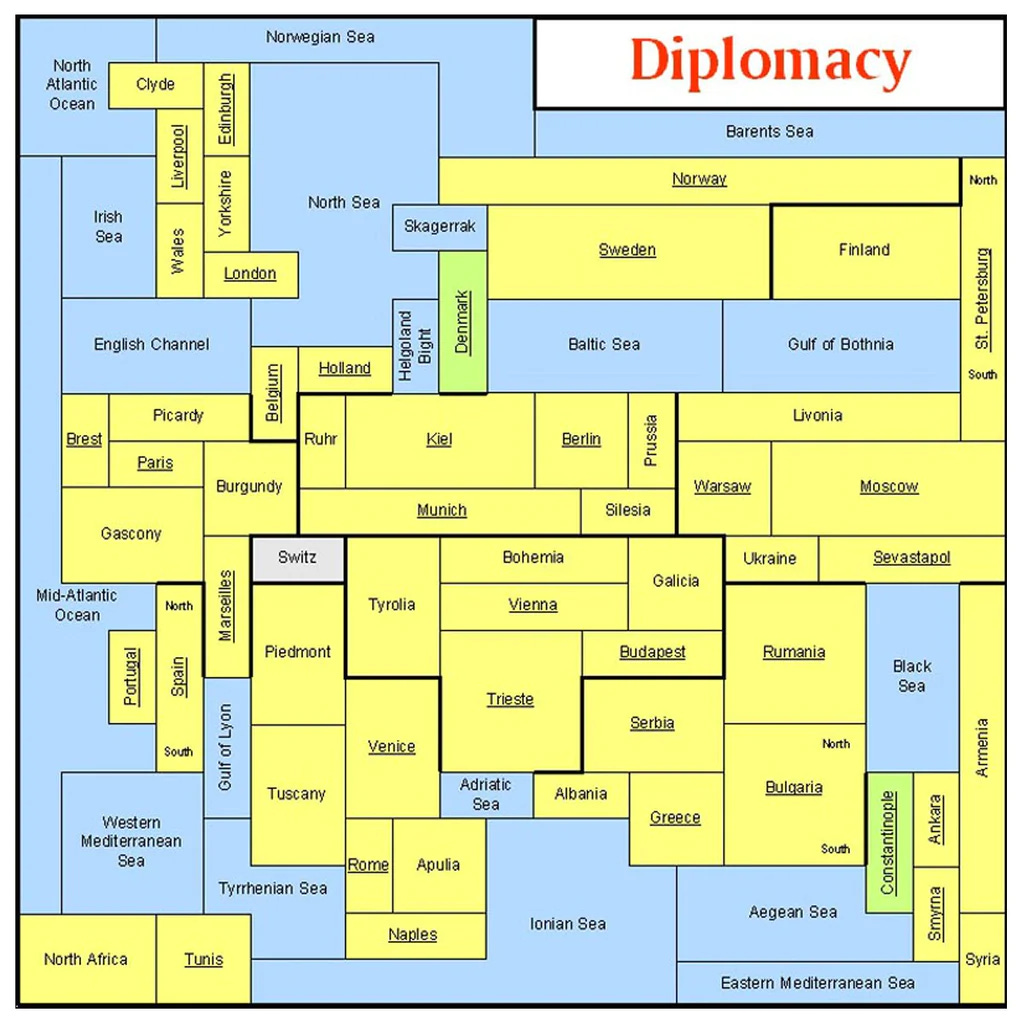Diplomacy: A Board Game for Sociopaths
WARNING!
Warning: The author of this article is a depraved sociopath who takes sadistic pleasure in lying, cheating, and hurting other people. He is an unmitigated narcissist, psychopath, and practitioner of Machiavellianism on both a philosophical and psychological level. It is this dark triad of traits that drew him to the board game Diplomacy.
Author’s note: Hold up! That warning is a considerable exaggeration! I do not enjoy hurting people, nor am I particularly fond of lying. And, while I am quite fond of Machiavellian political thought, I believe in Aristotelian ethics way more.
I’ve no defense against accusations of narcissism, though. What can I say? I am pretty great!
What is Diplomacy?
We’ll get to that in a second. But first… All rise for the Diplomacy National Anthem.
Diplomacy is like chess but for sociopaths social skills.
Diplomacy is a 7-player board game. Each player is randomly assigned 1 of 7 powers on the board, each with its own unique start position and accompanying strengths and weaknesses. These can range from Russia with an extra starting unit, to Turkey with its powerful defensive position in a corner of the map, to Italy which is objectively terrible (points for realism, though.)
The board is divided into land, sea, and coastal provinces. Some provinces are marked as Supply Centers (SCs.) A player can support one unit (an army or a fleet) per supply center they control. Armies travel inland while fleets travel on the sea. Both can traverse coastal provinces. The objective of the game is to capture half plus 1 SCs on the board (17+1 out of 34 SCs on the classic board). A player is eliminated when they lose their last SC.
There is no randomization in Diplomacy. Everything is processed deterministically. That, combined with the fact that every player is just as strong as every other player, means that it’s impossible to succeed alone. Progress is only possible through cooperation with and manipulation of other players.
It’s impossible to succeed alone. Progress is only possible through cooperation with and manipulation of other players.
The game starts in spring 1901. There is one spring and one autumn season per year. After each autumn there is a build phase when players build and destroy units until their unit count is equal to the number of SCs they control.
There’s a negotiating period between each season’s processing when players can communicate with each other and write their orders for the next season. Orders have to be written down because there are no player turns in Diplomacy. All orders are processed simultaneously. You won’t know if a player lied to you during the negotiating phase until it’s too late.
If you would like an in-depth tutorial of the game’s mechanics, WebDiplomacy has an excellent tutorial. It’s also where you can play Diplomacy online.
Winning and “Winning”
Since Diplomacy is a 7-player free-for-all, the chances of winning should be 1-in-7. But the chance of a solo victory (often called “soloing”) is, in fact, far lower because the most common outcome to a game of Diplomacy is not a solo victory but a multi-power draw. A draw happens when all of the surviving players agree to end the game.
Surviving to a draw is the source of some controversy. It’s usually accepted that a draw with less players is better than a draw with more. Surviving in a 3-way draw is better than a 4-way draw. (2-way draws are highly unstable so they require a great deal of trust. This makes 2-way draws even harder to achieve than solo victories.)
But is surviving with more SCs better than surviving with less? Some believe that surviving to a draw is just as good regardless of whether it’s with 1 SC or 17. Others say that, in case of a draw, players with more SCs have done better than those with less. But then they argue about whether it’s linearly better or exponentially better per SC. This matters because most online Diplomacy websites have a points system in which players must wager points to join games. The site’s view on draws will determine how it distributes the pot to the survivors. (Solo winners take all, of course.)
Most online Diplomacy websites have a points system in which players must wager points to join games. The site’s view on draws will determine how it distributes the pot to the survivors.
In general, soloing is better than surviving, surviving with more SCs is usually better than surviving with less, and surviving with any amount of SCs is better than getting eliminated.
Why Diplomacy Matters
If you spend 10,000 hours getting really good at a game like chess, you become better at playing chess and only at playing chess. Those 10,000 hours will count for nothing the moment you do something else.
That’s not true of Diplomacy. It teaches you the most useful skill a person can have, the only universal skill: how to deal with other people. As a board game, Diplomacy still requires some esoteric knowledge concerning “board-play.” But only 20% of Diplomacy is played on the board. Most of Diplomacy is played in the collective minds of its 7 players.
Only 20% of Diplomacy is played on the board. Most of Diplomacy is played in the collective minds of its 7 players.
Here are just a few things a player will do in an average game of Diplomacy:
Meet new people.
Make a good first-impression.
Display high value.
Propose, structure, negotiate, and close deals (all separate but related skills).
Determine others’ motives.
Detect lies.
Tell lies.
Tell truths (which is often harder than lying).
Withhold emotions.
Fake emotions.
This list could go on…
Every skill you learn and practice in diplomacy, aside from those related to board-play, is applicable to real life. But that doesn’t mean you should always use them…
Diplomacy Meets Real Life
Diplomacy is a zero-sum game with a defined ending. It rewards sociopathic short-term behaviour just as much as (or more than) healthy and constructive long-term behaviour. You can only grow at the other players’ expense and you can get away with betraying them because that defined ending will protect you from the consequences of your treachery.
But real life is a game with a growing pot and no definite ending. You can profit without hurting others and usually profit most when others are profiting too. Not even death ends your game because your “game” will just get passed on to your children. (You do plan on having children, don’t you?) In the real world, behaving like a sociopath will come back to haunt you.
You do plan on having children, don’t you?
The value of Diplomacy’s lessons are, thus, limited because man does not live in the Hobbesian anarchic hell of all-against-all. But there is an institution created by man that does… the real-life counterpart to the game’s powers: the state.
The Abyss Gazes Back
It’s very difficult to subvert a complex system. Systems exert selection pressures on their subjects that select for and against the subjects’ inherent natures. Put a wide array of animals into different environments and watch as they thrive or fail in those which they are best and worst adapted to.
Every game like Diplomacy has its care bears: the kinds of people who play games of deception intending to be 100% honest. They believe that personal moral superiority can beat the edifice of lies and manipulations. They never last long.
The same thing happens in politics. There’s no shortage of guileless young statesmen who believe that, if only the right people were in charge, government could work - that bad actors are what's holding the system back and that their removal would fix it. It doesn’t take long before they discover that the government is working exactly as intended and that they're the bad actors due for removal. It’s a matter of public record that Diplomacy was a favorite of both Henry Kissinger and John F. Kennedy.1 The unsuited inevitably get selected out.
It’s a matter of public record that Diplomacy was a favorite of both Henry Kissinger and John F. Kennedy.
Diplomacy’s greatest lesson is in how to think like a polity. The game demonstrates why states engage in wars, occupations, and espionage on a global scale while ignoring the “collateral damage” they cause.
Imagine if the game tracked how much suffering (military casualties, civilians killed and displaced, economies ruined, lives destroyed, and more…) the players’ collective actions were causing. Even if the game did this, no player would act any differently because no player could act any differently. In the geopolitical environment, if one does not pursue one’s own interests, someone else will.
Diplomacy is a distillation of the geopolitical dilemma. It recreates the environment of geopolitics that selects for ruthless pragmatism; for amoral self-interest; for, in a word, realpolitik. This enviornment allows those players and polities who exhibit these traits to thrive and multiply while destroying those who do not. This is a system that man does not live in but that his creation, the state, does.
Adieu
Maybe the real diplomacy was the friends we stabbed along the way?
Diplomacy is, by far, my favorite board game. No two games turn out the same way and every game teaches you something new about yourself and about the people you played it with. I will admit, though, that the paranoid, cut-throat, and manipulative gameplay will only appeal to a limited number of people.
If you would like to try Diplomacy for yourself, then I recommend either:
WebDiplomacy: https://webdiplomacy.net/
or PlayDiplomacy: https://www.playdiplomacy.com/
You can also pick up a physical copy here: https://amzn.to/3iSEtf6 Note that as an Amazon Associate I earn from qualifying purchases.
As always, there’s more to come so subscribe below.








